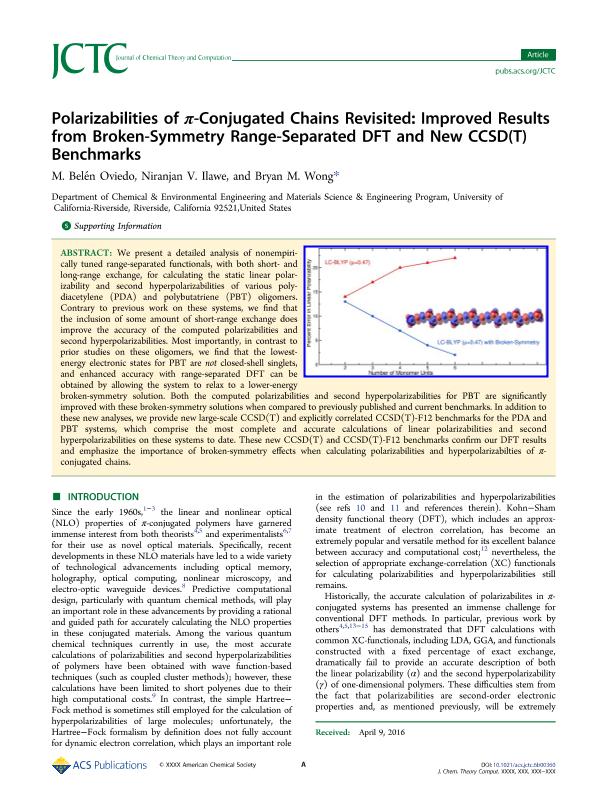Mostrar el registro sencillo del ítem
dc.contributor.author
Oviedo, María Belén

dc.contributor.author
Ilawe, Niranjan V.
dc.contributor.author
Wong, Bryan M.
dc.date.available
2018-08-03T20:27:57Z
dc.date.issued
2016-08-22
dc.identifier.citation
Oviedo, María Belén; Ilawe, Niranjan V.; Wong, Bryan M.; Polarizabilities of π-Conjugated Chains Revisited: Improved Results from Broken-Symmetry Range-Separated DFT and New CCSD(T) Benchmarks; American Chemical Society; Journal of Chemical Theory and Computation; 12; 8; 22-8-2016; 3593-3602
dc.identifier.issn
1549-9618
dc.identifier.uri
http://hdl.handle.net/11336/54163
dc.description.abstract
We present a detailed analysis of nonempirically tuned range-separated functionals, with both short- and long-range exchange, for calculating the static linear polarizability and second hyperpolarizabilities of various polydiacetylene (PDA) and polybutatriene (PBT) oligomers. Contrary to previous work on these systems, we find that the inclusion of some amount of short-range exchange does improve the accuracy of the computed polarizabilities and second hyperpolarizabilities. Most importantly, in contrast to prior studies on these oligomers, we find that the lowest-energy electronic states for PBT are not closed-shell singlets, and enhanced accuracy with range-separated DFT can be obtained by allowing the system to relax to a lower-energy broken-symmetry solution. Both the computed polarizabilities and second hyperpolarizabilities for PBT are significantly improved with these broken-symmetry solutions when compared to previously published and current benchmarks. In addition to these new analyses, we provide new large-scale CCSD(T) and explicitly correlated CCSD(T)-F12 benchmarks for the PDA and PBT systems, which comprise the most complete and accurate calculations of linear polarizabilities and second hyperpolarizabilities on these systems to date. These new CCSD(T) and CCSD(T)-F12 benchmarks confirm our DFT results and emphasize the importance of broken-symmetry effects when calculating polarizabilities and hyperpolarizabilties of π-conjugated chains.
dc.format
application/pdf
dc.language.iso
eng
dc.publisher
American Chemical Society

dc.rights
info:eu-repo/semantics/openAccess
dc.rights.uri
https://creativecommons.org/licenses/by-nc-sa/2.5/ar/
dc.subject
Dft
dc.subject
Polarizabilities
dc.subject
Broken Symmetry
dc.subject.classification
Otras Ciencias Químicas

dc.subject.classification
Ciencias Químicas

dc.subject.classification
CIENCIAS NATURALES Y EXACTAS

dc.title
Polarizabilities of π-Conjugated Chains Revisited: Improved Results from Broken-Symmetry Range-Separated DFT and New CCSD(T) Benchmarks
dc.type
info:eu-repo/semantics/article
dc.type
info:ar-repo/semantics/artículo
dc.type
info:eu-repo/semantics/publishedVersion
dc.date.updated
2018-07-30T15:20:50Z
dc.journal.volume
12
dc.journal.number
8
dc.journal.pagination
3593-3602
dc.journal.pais
Estados Unidos

dc.journal.ciudad
Washington
dc.description.fil
Fil: Oviedo, María Belén. University Of California Riverside; Estados Unidos. Consejo Nacional de Investigaciones Científicas y Técnicas; Argentina
dc.description.fil
Fil: Ilawe, Niranjan V.. University Of California Riverside; Estados Unidos
dc.description.fil
Fil: Wong, Bryan M.. University Of California Riverside; Estados Unidos
dc.journal.title
Journal of Chemical Theory and Computation

dc.relation.alternativeid
info:eu-repo/semantics/altIdentifier/url/https://pubs.acs.org/doi/abs/10.1021/acs.jctc.6b00360
dc.relation.alternativeid
info:eu-repo/semantics/altIdentifier/doi/http://dx.doi.org/10.1021/acs.jctc.6b00360
Archivos asociados
